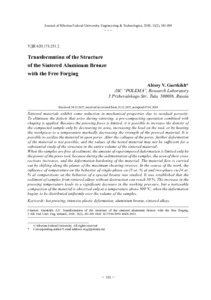Преобразование структуры спеченной алюминиевой бронзы при свободной ковке
Скачать файл:
URI (для ссылок/цитирований):
https://elib.sfu-kras.ru/handle/2311/70960Автор:
Гурских, А.В.
Gurskikh, Alexey V.
Дата:
2018-03Журнал:
Журнал Сибирского федерального университета. Гуманитарные науки. Journal of Siberian Federal University. Humanities & Social Sciences;2018 11 (3)Аннотация:
Спеченные материалы демонстрируют некоторое снижение механических свойств из-за
остаточной пористости. Для устранения дефектов, возникающих при спекании, применяют
операцию доуплотнения, совмещенную с формообразованием. В силу того, что усилия
прессования ограничены, плотность прессуемого образца повышается только за счет
уменьшения его площади, с возрастанием нагрузки на инструмент, или за счет нагрева
заготовки до температуры, заметно снижающей прочность прессуемого материала. При
этом возможно окисление материала в открытых порах. После схлопывания пор дальнейшая
деформация материала невозможна, а величины испытанной может оказаться недостаточной
для существенной проработки структуры во всем объеме спеченного материала.
При свободной осадке образцов величина наложенной деформации ограничивается только
мощностью прессового инструмента, поскольку во время осадки образцов происходит
увеличение площади их сечения, а также деформационное упрочнение материала. Течение
материала осуществляется сдвигом вдоль плоскостей максимальных сдвигающих напряжений.
В ходе работы было исследовано влияние температуры на поведение при сжатии спеченной
бронзы однофазного Cu-15 ат.% Al и двухфазного Cu-24 ат.% Al составов. Установлено, что
осадка образцов из спеченных сплавов без разрушения может достигать 30 %. Повышение
температуры прессования приводит к значительному снижению рабочего давления, однако
заметное уплотнение материала наблюдается только при температуре выше 500 °С, когда
деформация начинает распределяться по объему образцов относительно однородно Sintered materials exhibit some reduction in mechanical properties due to residual porosity.
To eliminate the defects that arise during sintering, a pre-compacting operation combined with
shaping is applied. Because the pressing force is limited, it is possible to increase the density of
the compacted sample only by decreasing its area, increasing the load on the tool, or by heating
the workpiece to a temperature markedly decreasing the strength of the pressed material. It is
possible to oxidize the material in open pores. After the collapse of the pores, further deformation
of the material is not possible, and the values of the tested material may not be sufficient for a
substantial study of the structure in the entire volume of the sintered material.
When the samples are free of sediment, the amount of superimposed deformation is limited only by
the power of the press tool, because during the sedimentation of the samples, the area of their cross
sections increases, and the deformation hardening of the material. The material flow is carried
out by shifting along the planes of the maximum shearing stresses. In the course of the work, the
influence of temperature on the behavior of single-phase cu-15 at. % al and two-phase cu-24 at.
% al compositions on the behavior of a special bronze was studied. It was established that the
sediment of samples from sintered alloys without destruction can reach 30 %. The increase in the
pressing temperature leads to a significant decrease in the working pressure, but a noticeable
compaction of the material is observed only at a temperature above 500 °С, when the deformation
begins to be distributed uniformly over the volume of the samples

